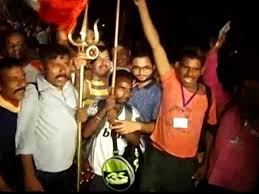There comes a moment when a “cause” gets buried under the debris of its own failings. Or when a single incident is enough for a journey to lose its moral compass. This moment has come for Kashmir.
A terrorist attack Monday on Hindu pilgrims has brought Kashmir’s 27-year-old insurgency to a critical crossroads. While on the Amarnath Yatra, an annual holy ritual for devout Hindus to a mountainous cave revered as the abode of Shiva, seven yatris (pilgrims) were fatally shot and 19 were injured. Six of those killed were women. The assault took place on the first Monday of Shravan, one of the holiest months in the Hindu calendar. The Pakistan-backed Islamist terrorist group Lashkar-e-Taiba is suspected to be behind the attack.
Less than a month ago, during the holy night of Shab-e-Qadr, a Kashmiri police officer, Ayub Pandith, was lynched outside Srinagar’s Jamia Masjid mosque by a mob that stripped him and pummeled him with stones and rods. As they killed him, they raised hate-filled slogans of support for Zakir Musa, a Kashmiri whose videos have called for a ‘caliphate’ and the beheading of all secessionists who term the Kashmir issue as a political instead of a religious movement to establish Islamic rule.
Coupled together, these two shameful eruptions of hatred and terrorism have eroded the legitimacy of other genuine political grievances and disappointments of the Kashmiri people. They have brought the freedom-seeking, stone-pelting agitators to an uncomfortable point. How do they seek to define themselves? Who are their heroes? Armed, jihadist terrorists who target innocent civilians? As the social fabric of the Kashmir Valley changes and a Wahhabi strain of Islam takes deeper roots in a rage-filled generation of young, educated men who are picking up the gun, Kashmiris must pause and ask themselves: Is this how they would like to be represented?
In the land of Mahatma Gandhi, why is there not one nonviolent icon in the Kashmir Valley? Protesters could have looked to the northeast of India, where Irom Sharmila, a frail woman with untidy, frazzled hair and a barely audible, raspy voice, fasted for 16 years (force-fed through a nasal gastric tube) to challenge laws that gave the army legal immunity. Why has Kashmir never had its own Irom Sharmila? When will Kashmiris realize that terrorists like Zakir Musa or Burhan Wani (a local miliant whose elimination by Indian security forces a year ago triggered a fresh phase of unrest) are not benefactors, but enemies who have sabotaged and hijacked both their credibility and best interests? And how do Kashmiris rationalize that what they once called a homespun political issue rooted in ethno-nationlism is today entirely controlled by Pakistan-exported terrorists? Groups like the Lashkar, whose chief patron, Hafiz Saeed, enjoys complete impunity in Pakistan (despite a $10 million bounty announced by the United States in 2012) are now completely in charge.
To watch what is happening today is a moment of personal heartbreak for some of us whose journalistic lives have been devoted to reporting the intricate complexities of Jammu and Kashmir. Those of us who argue that the Indian state, too, has made historic mistakes of omission and commission (a rigged election in the ’80s, issues of human rights violations and the failure of political imagination by successive central governments) are often met with the opprobrium of people who see us as anti-national bleeding hearts. I have always argued that more of us in India need to show empathy and compassion for the Kashmiri people and not just proprietorial rage over the territory they inhabit. But will Kashmiris also rise as one against the killings of civilians, soldiers and policemen committed in their name?
My Kashmiri friends were enraged by an earlier column I wrote for The Post arguing that the world no longer has interest in a Kashmir mired in religious radicalization and swarming with gun-carrying militants. But this month’s twin moments of shame have forced a reality check. “This could be Kashmir’s 9/11 moment,” Kashmiri journalist Ahmed Ali Fayyaz told me, to emphasize that this is a unique turning point for the valley.
Every Kashmiri I know has been repulsed by the uptick in violence — by Monday’s terrorist strike, as well as the mob-murder of Pandith, the police officer. There has been unequivocal condemnation. The local economy of hotels, porters, pony operators is all linked to the commerce that the holy pilgrimage of the Amarnath Yatra brings. Besides, Kashmiris have always prided themselves on their Shivaite traditions and syncretic roots. But in an increasingly dehumanized environment, do the pluralists control the street, or the extremists? Right now, the extremists are winning.
If Kashmir is being tested, so is the rest of India. Terrorists have ruined Kashmir. Now they want to start communal riots in India by driving a wedge between Hindus and Muslims. The backlash to this cannot not be a surge in hate crimes against Muslim citizens, similar to the sort we have seen recently in the lynching of hapless cattle-traders by so-called cow protectionists of the Hindu right. Those killings prompted enraged Indian liberals to organize protest marches with placards that declared #NotInMyName. We must continue to say that and ensure that there is no further fanning of polarization.
But Kashmiris, too, must rise up and say Not In Our Name; or else the freedom for the Kashmir they hold so dear — and complain has been trampled upon — will be just another example of the withering away of humanity.
Barkha Dutt





